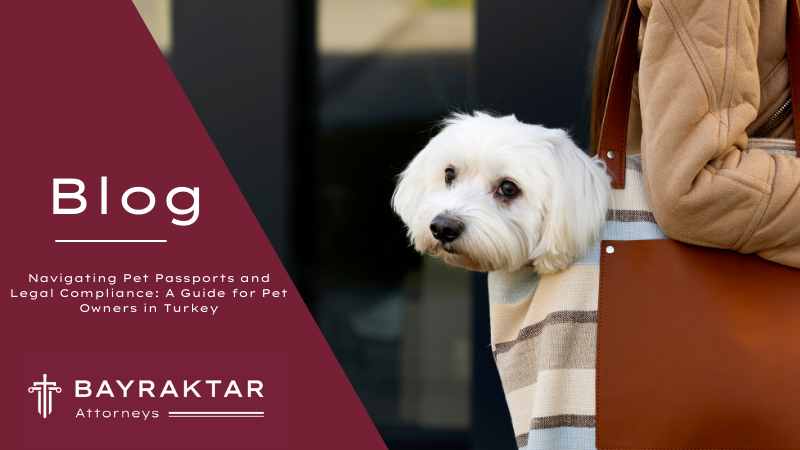
Bringing your furry friend to Turkey can be an exciting adventure, but it’s essential to understand the legal requirements and ensure compliance with Turkish laws. In this blog post, we, Bayraktar Attorneys, aim to provide a comprehensive guide to pet passports, bringing your pet to Turkey, and the legal aspects involved.
Pet Passports in Turkey
What is a Pet Passport?
A pet passport is an essential document for travelling with your pet. In Turkey, pet passports contain information about your pet’s identity, vaccinations, and health records. It serves as proof that your pet meets the necessary health requirements for entry into the country.
Required Documentation
To obtain a pet passport in Turkey, you generally need the following documents:
- Microchip Implantation: Ensure your pet has a microchip for identification purposes.
- Rabies Vaccination Certificate: Pets must be vaccinated against rabies, and the vaccination should be administered at least 21 days before travel.
- Health Certificate: A veterinary health certificate, issued within 10 days of travel, confirming your pet is in good health and fit for travel.
Bringing Your Pet to Turkey: Entry Regulations
When bringing your pet to Turkey, adhere to the following entry regulations:
- Customs Declaration: Declare your pet at the customs checkpoint upon arrival in Turkey. Upon entering the Turkish Customs Zone through land, air, or sea entry points, individuals transporting animals or animal products through passenger halls are required to pass through either the red or green customs lines depending on the situation. In this way, it is considered that customs declaration has been made. The use of any of these lines does not imply that the importation of animals or animal products prohibited or subject to permission can be introduced into Turkey.
- Microchip Verification: Ensure the microchip’s compatibility with ISO 11784/11785 standards.
- Rabies Vaccination Records: Carry the rabies vaccination certificate, indicating the date of vaccination and its validity.
If your travel involves road transportation, you may find yourself crossing the borders of different countries, necessitating compliance with pet transportation regulations for those specific countries. Opting for air travel might prove more advantageous in this scenario. However, if road travel is unavoidable, thorough research into the pet transportation regulations of the transit countries becomes essential.
When opting for air travel, it’s crucial to seek advice from an expert. Each airline has its own set of pet-friendly policies governing the transportation of pets. Some airlines may impose restrictions on certain breeds, mixed breeds, or specific dog breeds such as Pitbull, Rottweiler, or Doberman. It’s important to note that conditions, requirements, and rules can vary significantly among different airlines.
If you’re planning a journey to Turkey from the UK, the United Arab Emirates, or Qatar with a connecting flight, it’s advisable to meet with a representative from the airline before purchasing your ticket. Due to these countries not accepting pets from abroad, understanding the limitations associated with these flights is crucial before making any ticket purchases for verification purposes.
Make sure to secure a reservation with the airline well in advance. There’s typically a limit on the number of animals permitted on a single flight. The proactive approach of making an advance reservation and obtaining accurate information about the process firsthand is the most prudent way to proceed.
For those who prefer not to handle these steps independently, there are companies available to manage the entire process on your behalf. These companies offer comprehensive services for pet transportation, covering everything from the actual transport of your pet to handling documentation. Conducting some research within the industry to identify professionals offering the most suitable services will significantly streamline the procedures.
Legal Compliance in Turkey
It’s crucial to be aware of the current Turkish laws regarding pets.
- Leash Laws: In many public places, dogs must be kept on a leash. Ensure compliance with local regulations.
- Breed Restrictions: Some municipalities may have restrictions on specific dog breeds. Research the regulations in your area.
- Pet Ownership Limits: Check if there are any limitations on the number of pets you can own in your municipality.
Before embarking on your journey with your pet to Turkey, thoroughly research and understand the current laws and regulations. Failure to comply with these regulations may lead to complications during travel or even legal consequences. If you have any legal concerns or need assistance, Bayraktar Attorneys is here to help.
For the most up-to-date information, consult with relevant authorities or legal professionals. Safe travels with your beloved pet!







